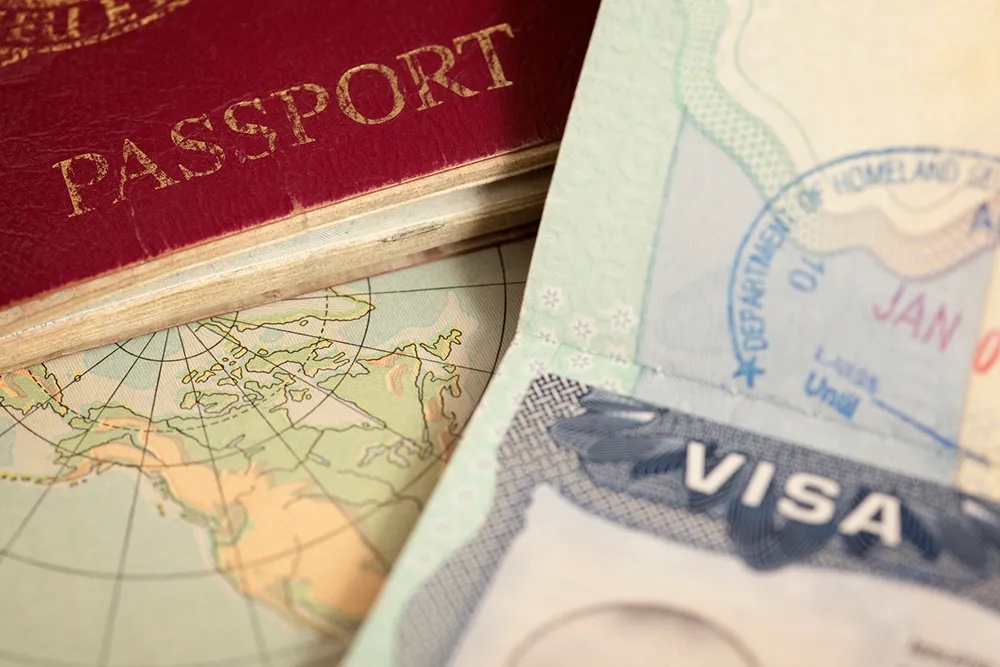A personal note as October 15, 2025, marks an occasion of sorts: when my husband’s and my Portuguese residency permits expire. Isn’t that a bit sloppy, you might ask, allowing your permission to remain in a country where you live to lapse? On one party’s part, very sloppy, but not ours.
At least a dozen people must have exclaimed to me: “Oh, I’ve thought about moving to Portugal!” After emigrating from London in 2023, I’m not issuing a warning, exactly. We don’t regret the move. Landscape gorgeous, food great, people nice, wine cheap. But this country is notoriously bureaucratic, and the paperwork side of playing Mother, May I? with Portuguese immigration was and remains a nightmare. More generally, there seems to be a perversely inverse relationship between the ease with which foreigners can gatecrash western countries by breaking the law and the diabolical complexity, expense, effort and time required to immigrate to these same countries by following the rules.
Let’s revisit an era subject to very little nostalgia on my end. Our original visa application required: a Portuguese bank account with at least €18,000. A Número de Identificação Fiscal, or NIF. Travel health insurance and private in-country health insurance (along with Medicare, Britain’s National Health Service and emergency evacuation insurance for a lit fest at sea, that year I was covered by five health insurance entities simultaneously; my, didn’t I feel safe). A criminal records check from London’s Metropolitan Police (lo, a summons for running a light on my bicycle in the city at 3 a.m. – with no traffic in sight – is actually lodged in my UK criminal record. That’ll teach me). Formal permission for a Portuguese criminal records check. Certified copies of both the deed and the land registry certificate for our new house outside Lisbon (of that agonizing purchase another time). Copies of the last three months’ statements of all our bank accounts in the UK, US and Portugal. Notarized copies of our passports. Proof of our permanent leave to remain in the UK. Copies of our London council tax bills going back several years, and two passport photographs each.
The process required two in-person appointments, the first in London with an overwhelmed embassy; pouncing on an available slot online demanded the same vigilance and uncanny good luck currently required to get a GP appointment in Britain. Its date delivered from on high with no warning, the Portuguese appointment required a larcenous, jam-packed round trip from New York to Lisbon during tourist season. Residency finally approved, the attempted delivery of our permits failed because we were abroad, so we had to grant our immigration lawyer power of attorney, then pay her to retrieve and FedEx the cards. Naturally, the legal fees for dotting every I throughout this rigmarole were substantial.
Legal immigration is a colossal headache for the very people the West should be welcoming
But! Residency must be renewed after two years (which fly by) and again three years after that; only thereafter can one apply for permanent settlement. But Portugal has made itself too popular for its own good, and last I read it had either 400,000 or 900,000 unaddressed immigration cases – how many hundreds of thousands hardly matters, given that the country’s entire population is only 11 million.
Originally expiring in July, our residency was extended to mid-October by a sweep of Portugal’s bureaucratic wand. Yet the rest of the EU won’t necessarily recognize this edict, of which we’ve no documentary evidence. We’re US passport holders, who like Britons may not spend more than 90 days out of 180 as tourists in the EU. Without proof of valid residency, my traveling to countries such as France, where I’ve a hefty fiction readership and translations coming out, risks being banned for five years from a continent where we live and own a house. Afraid to leave Portugal for exactly this reason, an American musician friend of ours had to decline multiple continental gigs for five months while waiting for his renewed residency card to arrive in the post.
The state of play now? After getting NIFs, SNS numbers ( = NHS) and 12-digit tax portal passwords, we must still acquire “NISS” numbers, apparently for no other reason than to prevent the residency renewal process from snagging; getting social security numbers entails waiting in an office in Lisbon for hours and possibly all day.
Scuttlebutt has it that because Portuguese immigration has hired a batch of inexperienced employees to clear the case backlog, many newbies are turning down residency renewal applications even from well-off foreigners with local property due to niggling paperwork infractions.
That’s hardly in Portugal’s interest, after for years deliberately enticing foreigners with assets to invest here. Imagine, after all this blindingly tedious crap, we could be kicked out after two years.
Put off yet? And permanent residency will involve amassing the notarized passports, the three months’ worth of all our most recent bank statements, etc – oh, how much bother and boredom lurks in that tiny abbreviation – three more times. Portugal may be worse than some countries, but I bet it’s no worse than the United States, whose green card shenanigans are infamous. Legal immigration is a colossal headache for the very people the West should be welcoming – well-educated, law-abiding, unlikely to become dependent on the state and apt to be net cultural and economic contributors.
I’ve written repeatedly that we need to make immigration easier for qualified, credentialed and solvent applicants and vastly harder for less desirable immigrants hoping to sneak through the back door. Given the costly, byzantine horror show of the legit route to Portugal, we might have been better off spending £699: the price of an inflatable dinghy.
This article was originally published in The Spectator’s October 27, 2025 World edition.


























Leave a Reply